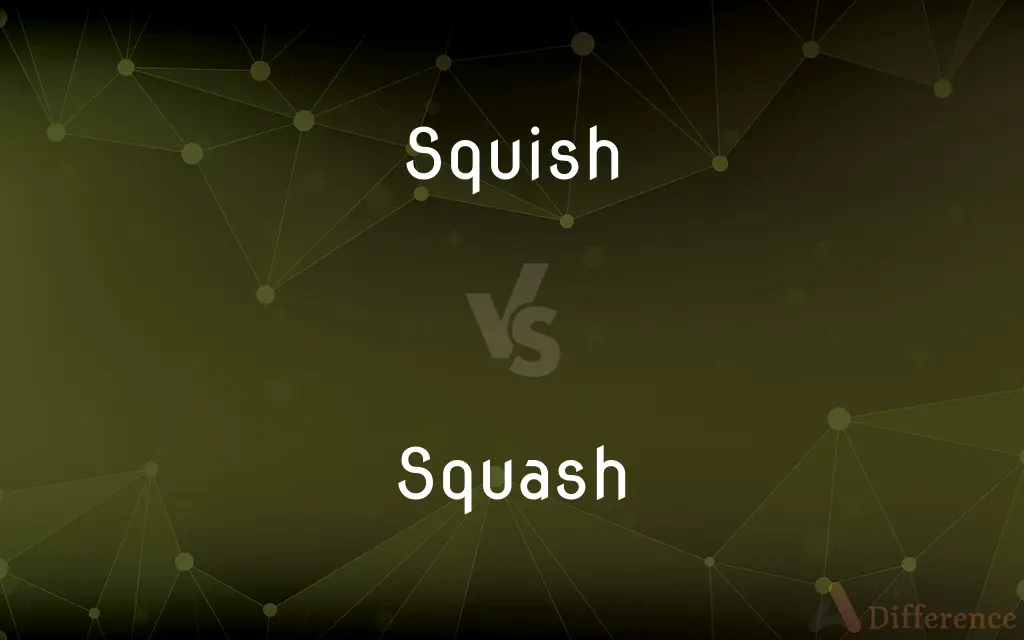Squish vs. Squash — What's the Difference?
By Tayyaba Rehman & Fiza Rafique — Updated on April 3, 2024
Squish implies compressing something soft into a misshapen mass, often with a wet sound, while squash involves crushing or flattening, typically implying more force and possibly destruction.

Difference Between Squish and Squash
Table of Contents
ADVERTISEMENT
Key Differences
Squish usually connotes a softer, often wet or moist, action where the object being compressed may change shape but not necessarily break apart. This term often carries a less violent connotation and is associated with materials that can return to their original form or close to it. On the other hand, squash implies a stronger force used to compress or flatten something, often to the point of changing its original form entirely or even breaking it. The term suggests a more aggressive or destructive action compared to squish.
When you squish something, it often produces a specific sound or sensation that indicates the nature of the material, like stepping in wet mud or squeezing a sponge. This action is usually associated with softer, more pliable materials that can absorb the compressing force without disintegrating. Whereas, to squash something, such as a bug or a ripe fruit underfoot, usually results in a more final or destructive outcome, leaving the object in a state from which recovery is not possible.
The intent behind squishing is often playful or investigative, exploring the texture or reaction of something soft and malleable. For example, squishing a piece of clay in your hand to feel its texture. Squashing, however, often has a more functional or sometimes accidental purpose, such as squashing a piece of fruit while trying to pack it too tightly or stepping on something inadvertently.
In terms of sounds, squishing is associated with softer, sometimes squelchy noises indicative of moisture and soft materials being pressed together. Squashing noises, on the other hand, might be more abrupt and louder, signaling the breaking or bursting of the object under pressure.
Comparison Chart
Connotation
Soft compression, often with a wet sound
Crushing or flattening with force
ADVERTISEMENT
Sound
Wet, squelchy noises
Abrupt, sometimes loud noises
Intent
Playful, investigative (texture or reaction exploration)
Functional, accidental (often leading to destruction)
Recovery
Possible return to original form or close to it
Original form is often irrecoverable
Materials
Softer, malleable materials (e.g., sponge, wet clay)
Can be soft but often involves more rigid materials (e.g., fruit)
Compare with Definitions
Squish
Often reversible or non-destructive compression.
The pillow returned to its shape after being squished.
Squash
Involves exerting pressure until breaking point.
Squashing the can required a lot of force.
Squish
Engaging in the act of playful or gentle pressing.
She couldn't resist squishing the plush toy.
Squash
Flattening or crushing with force.
He accidentally squashed the bug under his shoe.
Squish
Compressing softly, especially something moist.
He loved to squish the wet sand between his toes.
Squash
Usually results in irreversible change.
The sculpture couldn't be salvaged after it was squashed in the move.
Squish
Making a wet, soft sound upon compression.
The sponge made a squish sound when pressed.
Squash
The act leading to deformation or destruction.
The overripe tomato was easily squashed.
Squish
A sensation of softness and moisture when compressed.
Walking on the mossy ground felt like squishing a natural carpet.
Squash
Often associated with louder, more abrupt sounds.
The sound of squashing grapes could be heard across the vineyard.
Squish
To squeeze or crush together or into a flat mass; squash.
Squash
The fruit of any of these plants, eaten as a vegetable.
Squish
To emit the gurgling or sucking sound of soft mud being walked on.
Squash
The act or sound of squashing.
Squish
A squishing sound.
Squash
Something that has been squashed.
Squish
(Slang) A person regarded as weak and ineffective.
Squash
A crushed or crowded mass
A squash of people.
Squish
(countable) The sound or action of something, especially something moist, being squeezed or crushed.
Squash
(Sports) A game played on a four-walled court by two or four players who use long-handled rackets to hit a small rubber ball against the front wall, with play stopping if the ball bounces twice on the floor or does not reach the front wall after a stroke. Also called squash rackets.
Squish
A political moderate.
Squash
Chiefly British A citrus-based soft drink.
Squish
Marmalade.
Squash
To beat, squeeze, or press into a pulp or a flattened mass; crush.
Squish
To squeeze, compress, or crush (especially something moist).
The sandwich tasted fine, even though it had got squished in his lunchbox.
Squash
To put down or suppress; quash
Squash a revolt.
Squish
To be compressed or squeezed.
Squash
To silence or fluster, as with crushing words
Squash a heckler.
Squish
To make the sound of squirting water, like that made by the feet of one walking in mud or slush; to make a kind of gushing, swashing, or splashing sound; to move with such a sound.
Squash
To become crushed, flattened, or pulpy, as by pressure or impact.
Squish
A sound like that made by the feet of one walking in mud or slush; a gushing, swashing, or splashing sound; a squishing sound.
Squash
To move with a splashing or sucking sound, as when walking through boggy ground.
Squish
Walk through mud or mire;
We had to splosh across the wet meadow
Squash
With a squashing sound.
Squish
Put (a liquid) into a container or another place by means of a squirting action
Squash
(uncountable) A sport played in a walled court with a soft rubber ball and bats like tennis racquets.
Squash
(British) A soft drink made from a fruit-based concentrate diluted with water.
When I'm thirsty I drink squash; it tastes much nicer than plain water.
Squash
A place or a situation where people have limited space to move.
It's a bit of a squash in this small room.
Squash
(biology) A preparation made by placing material on a slide flat, rectangular piece of glass, covering it and applying pressure.
Squash
Something soft and easily crushed; especially, an unripe pod of peas.
Squash
Something unripe or soft.
Squash
A sudden fall of a heavy, soft body; also, a shock of soft bodies.
Squash
An extremely one-sided, usually short, match.
Squash
A plant and its fruit of any of a few species of the genus Cucurbita, or gourd kind.
Squash
Cucurbita maxima, including hubbard squash, great winter squash, buttercup squash, and some varieties of pumpkins.
Squash
Cucurbita argyrosperma (syn. Cucurbita mixta), cushaw squash.
Squash
Cucurbita moschata, butternut squash, Barbary squash, China squash.
Squash
Cucurbita pepo, most pumpkins, acorn squash, summer squash, zucchini.
Squash
(botany) Any other similar-looking plant of other genera.
Squash
Lagenaria siceraria (syn. Cucurbita verrucosa), calabash, long-neck squash.
Squash
(culinary) The edible or decorative fruit of these plants, or this fruit prepared as a dish.
We ate squash and green beans.
Squash
Muskrat.
Squash
(transitive) To beat or press into pulp or a flat mass; to crush.
Squash
To compress or restrict (oneself) into a small space; to squeeze.
Somehow, she squashed all her books into her backpack, which was now too heavy to carry.
We all managed to squash into Mum's tiny car.
Squash
(transitive) To suppress; to force into submission.
Squash
An American animal allied to the weasel.
Squash
A plant and its fruit of the genus Cucurbita, or gourd kind.
Squash
Something soft and easily crushed; especially, an unripe pod of pease.
Not yet old enough for a man, nor young enough for a boy; as a squash is before 't is a peascod.
Squash
Hence, something unripe or soft; - used in contempt.
Squash
A sudden fall of a heavy, soft body; also, a shock of soft bodies.
My fall was stopped by a terrible squash.
Squash
A game much like rackets, played in a walled court with soft rubber balls and bats like tennis rackets; - called also squash rackets.
Squash
To beat or press into pulp or a flat mass; to crush.
Squash
Any of numerous annual tendril-bearing trailing plants of the genus Cucurbita grown for their fleshy edible fruits
Squash
Edible fruit of a squash plant; eaten as a vegetable
Squash
A game played in an enclosed court by two or four players who strike the ball with long-handled rackets
Squash
To compress with violence, out of natural shape or condition;
Crush an aluminum can
Squeeze a lemon
Common Curiosities
What's the main difference between squish and squash?
The main difference is the intensity and outcome: squish is softer and often non-destructive, while squash implies more force and destruction.
Can the same object be squished and squashed?
Yes, depending on the force applied and the object's nature, it can be squished lightly or squashed completely.
Do both actions have specific contexts where they're used?
Squish is more common in less serious, playful contexts, while squash is used in more serious or accidental contexts.
Is squashing always intentional?
Not always; it can be accidental, especially in cases where the force applied was not meant to be destructive.
Can both actions produce sound?
Yes, but squish sounds are softer and wetter, while squash sounds are louder and more abrupt.
Is the intent always different between squishing and squashing?
Typically, yes. Squishing is often more playful or curious, while squashing can be accidental or purposeful but usually leads to destruction.
Can squishing ever lead to destruction?
While it's less common, excessive squishing, especially of fragile objects, can lead to damage.
Can something be squished and not make a sound?
Yes, especially if the material is very soft and the action is gentle.
Are both terms interchangeable?
Not really, as they imply different levels of force and outcomes.
What kind of materials are typically squished?
Softer, malleable materials that can compress and then return to form, like sponges or moist clay.
What materials are more likely to be squashed?
Materials that can undergo permanent deformation or destruction from the force applied, like insects or overripe fruit.
Why is squash associated with destruction?
Because it typically involves enough force to alter or break the object's structure irreversibly.
Does the sound made differentiate squish from squash?
Yes, squishing typically results in softer, wetter sounds, while squashing results in louder, more final sounds.
What emotions might be associated with squishing vs. squashing?
Squishing might evoke curiosity or amusement, while squashing might evoke frustration or anger, depending on the context.
Can both squish and squash be used metaphorically?
Yes, they can describe actions, feelings, or situations metaphorically, reflecting the intensity or nature of the action.
Share Your Discovery

Previous Comparison
Fungi vs. Fungus
Next Comparison
Boss vs. ChefAuthor Spotlight
Written by
Tayyaba RehmanTayyaba Rehman is a distinguished writer, currently serving as a primary contributor to askdifference.com. As a researcher in semantics and etymology, Tayyaba's passion for the complexity of languages and their distinctions has found a perfect home on the platform. Tayyaba delves into the intricacies of language, distinguishing between commonly confused words and phrases, thereby providing clarity for readers worldwide.
Co-written by
Fiza RafiqueFiza Rafique is a skilled content writer at AskDifference.com, where she meticulously refines and enhances written pieces. Drawing from her vast editorial expertise, Fiza ensures clarity, accuracy, and precision in every article. Passionate about language, she continually seeks to elevate the quality of content for readers worldwide.














































